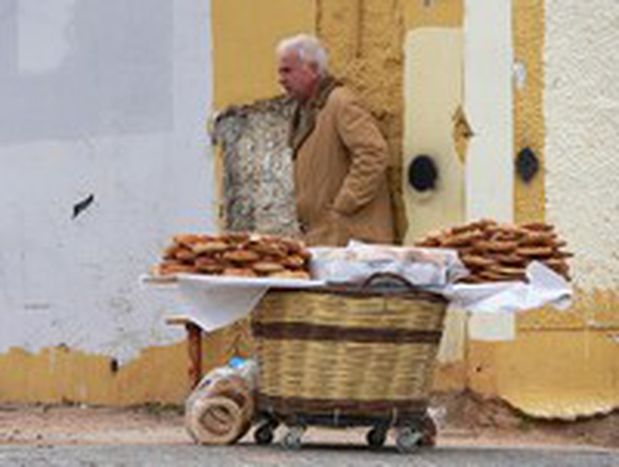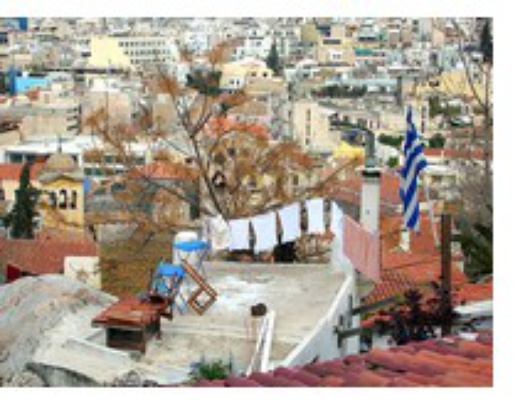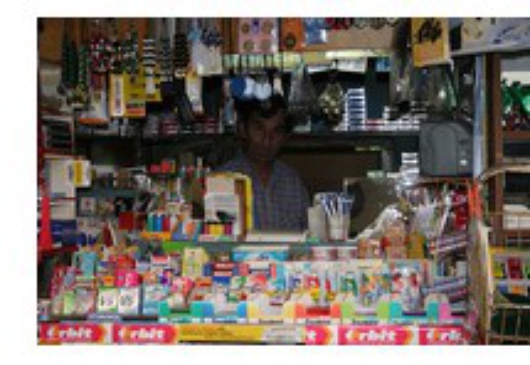
Illegal immigrants ignored by Athenians
Published on
Translation by:
Sarah GrayAt the crossroads of East and West, Athens has become the terminus of many migration routes. The Albanian community, the most numerous, is also the most stigmatised in Greece. It all stems from a misunderstanding
In the Omonia square, banners and small groups of people gather together. The Athenians, used to seeing such demonstrations, no longer pay them any attention. Gazmend Elezi, an Albanian who has come from the ‘cool’ student area of Exarchia, remains determined nonetheless. Ten years ago he decided to come to Greece, crossing the mountains on foot, whilst his brother chose Italy. ‘It was closer and cheaper,' says the 30=year-old. 'There was no need to pay someone to smuggle me in. I just had to get across the mountains.’
Today he is protesting, like other Albanians who have come to Omonia Square, against the ‘state theft which demands 150 Euros for a residence permit, and then delivers them when they are no longer valid. It’s a problem for me to remain without the proper documents. I can’t go back to Albania to see my family, I wouldn't be able to return to Greek soil afterwards.’ Weary, Gazmend has given up illegal work contracts in order to sign up at university.
‘The extreme complexity of procedure and the slow pace of bureaucracy discourages people when it comes to sorting out their situation,’ accuses Vassilis Chronopoulos, a member of the ‘Socrates’ association which works to help immigrants lost in the maze of Greek administration. ‘Another problem is illegal, cash-in-hand work which is very widespread in Greece, and creates more illegal immigration. Most illegal immigrants can’t prove they have a declared income and so are not covered by social security. Or it is impossible for them to prove that they have worked and therefore to renew their residence permit.’
600, 000 Albanians currently live in Greece, making up two-thirds of the total number of immigrants in the country. Most moved there following the fall of the Communist regime and after the collapse of the pyramid loans scheme in operation in Albania in the 1990s.
Matilda Kouramano, 19, is also Albanian but has Greek nationality. She comes from Sarandë, in the 'Northern Epirus’, the name given by the Greeks to this southern region of Albania which is populated by Greek communities. An orthodox cross around her neck, Matilda admits that she has not come across the same difficulties as her former countrymen have. ‘I left in 1997, during the civil war. In my home town, all the young people want to leave,’ she confides. ‘Thanks to my mother and father’s Greek origins, I have quickly integrated into society here.’
Co-existing migrations
In fact, immigration into Greece is split into two co-existing situations. Firstly, there is that of immigrants of Greek origin, coming from Albania, Georgia, Armenia, Kazakhstan. Secondly, there is that of non-Greeks, also coming from Albania, as well as Bulgaria, Pakistan and Nigeria. ‘There is positive discrimination towards Greeks because the country continues to favour blood ties, making integration and relationships between different communities more difficult,’ says Anna Triandafyllidou, a researcher on immigration at the Eliamep Institute.
 The rules for non-Greek immigrants are still very strict: ‘children of non-Greek origin, for example, have to ask for a residence permit when they reach 18, regardless of the fact that they were born in Greece’, Triandafyllidou explains. ‘Then the problem is renewing the permit, since to do so you have to have worked 400 days in a two-year period’.
The rules for non-Greek immigrants are still very strict: ‘children of non-Greek origin, for example, have to ask for a residence permit when they reach 18, regardless of the fact that they were born in Greece’, Triandafyllidou explains. ‘Then the problem is renewing the permit, since to do so you have to have worked 400 days in a two-year period’.
Another difficulty: Greece, traditionally a country of emigration, is badly prepared for tackling the opposite problem of immigration. ‘In 1992, Greece invited its nationals living abroad to return. The government quickly realised that that was not a good idea, because it sparked large-scale population movement and a competition over who could be the most 'Greek',' the researcher adds.
These immigrant influxes were before long portrayed by the media as an invasion. Later, they were viewed as a breeding ground for organised crime, because certain detainees released from Albanian prisons crossed the border into Greece. Then it was said that Albanian workers were pushing wages down. Finally, the recent scandal surrounding a film showing two Albanians who were mistreated by Greek police officers has brought the Albanian question back into the spotlight.
‘We can no longer work like this’
'We can no longer work according to waves of regularisation of immigrants, as has happened in 1998, 2001, 2005,' says Triandafyllidou, in a frank and unambiguous response to the question of immigration policy. ‘Each time they have to renew their residence permits, we fall back into the same vicious cycle. It is time to react - immigration into Greece has been going on for 20 years now.’
Ilias Bellou, an Albanian from Voskopolje who also arrived in Greece on foot, is now a lawyer working to defend the rights of Albanian immigrants. He is pleading for an 'immigration policy for the next two decades’. For him, making life hard for immigrants leads only to injustice and poverty, and others seek to take advantage of these conditions.
‘Illegal, cash-in-hand work continues, making Greece more competitive but causing the state to lose large sums of money. Albanians or Bulgarians will no longer work for low wages and are demanding their rights. All these people work, create wealth in Greece but do not benefit from social security. The solution is to get immigration organised.’
Liliana Tsourdi is of the same opinion. Fighting to defend the rights of asylum seekers in Greece, she has ideals: ‘A few years ago, Greece was one of the worst countries in which to seek asylum. We were not even considered a safe country under the UN High Commissioner for Refugees (UNHCR) criteria’, she reminds us.
‘Today we have a proper programme, thanks to the adaptation of European directives. Civil servants and police officers still need further training to make sure these rights are granted. But I am convinced that, as for the right to asylum, the European Union must have a common policy on the issue of immigration’.
More newcomers are settling in in the Sophocleous Road area in Athens. Chinese, Pakistanis, Bangladeshis and Africans have ended up in Greece whilst en route for western Europe and set up their businesses in the street, to be replaced after nightfall by Nigerian prostitutes. ‘Would you like a bow? Or a quiver?’ offer the statuesque Africans in Monastiraki square, right in the centre of Athens. Others sell clearly more useful items, like pirated films.
 But just like the Albanians working illegally on building sites or farms, or the Bulgarians in the tourist industry, these illegal immigrants keep the unofficial economy turning, an economy which, according to the ILO, makes up between 30 and 35% of Greece’s GDP. It's the highest level in the EU, and a real problem for Greece.
But just like the Albanians working illegally on building sites or farms, or the Bulgarians in the tourist industry, these illegal immigrants keep the unofficial economy turning, an economy which, according to the ILO, makes up between 30 and 35% of Greece’s GDP. It's the highest level in the EU, and a real problem for Greece.
A tradition of welcoming the ‘homogenis’
‘It was after the war over Anatolia (or Asia Minor), in 1920. Following the defeat, Greek diplomat Venizelos and modern Turkey's founder Mustafa Kemal Atatürk came to an agreement for an exchange of peoples. All the Greeks, merchants descended from the Greek trading posts of antiquity and the Byzantine period, those from the Black Sea and the Aegean, had to leave. My father’s grandparents were living in Trabzon in Turkey. They came by road and settled in the newly reconquered northern part of Greece, near Edirne. It's where my father met my mother, whose parents were returning to Greece from Turkish Thrace.’
Pavlos Giannoulidis has learnt this story from snatches of information. Like many Greeks, he is amongst the descendants of the two million repatriated Greeks from Anatolia, who returned in the 1920s and who still live in certain areas of Athens, such as Néa Smyrni> (‘New Smyrna’, Smyrna being the historical name for Izmir).
Today Greek people born abroad, in Albania, but also in the former USSR, Georgia, Armenia, Russia and Kazakhstan. They are returning to the motherland where they easily obtain citizenship. ‘In total, 150, 000 homogenis or Greeks born abroad, have returned to Greece since the fall of the Berlin Wall in 1991,' says Triandafyllidou. 'Many have been re-housed, thanks to a state-funded programme, in the very mixed area of Greek Thrace, in the north, near the Turkish border. However, this area is Greece’s poorest, and has the highest unemployment rate. This favourable treatment of foreign-born Greeks has created tensions within the large Turkish community. Unable to speak much Greek, it is difficult for many of them to integrate and they end up returning to Athens.’
Thanks to Elina, Olga and Pavlos
In-text photos: (Rob Wallace/ Mahmood/ Flickr)
Translated from Ces clandestins qu’Athènes ne veut pas voir



